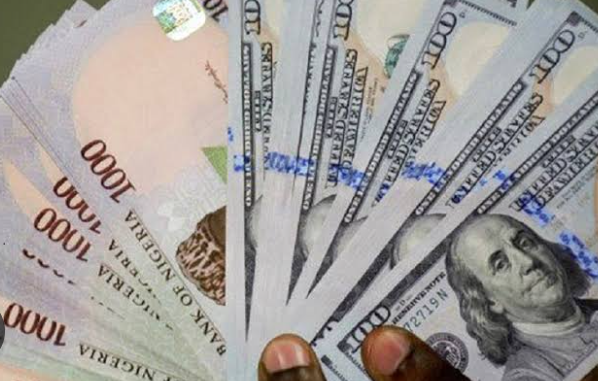
Naira Plummets to N1,612/$1 at Official Market Amidst Ongoing Forex Challenges
The Nigerian naira has continued its downward spiral in the official Nigerian Foreign Exchange Market (NFEM), closing at a staggering N1,612 per dollar on Wednesday, May 7, 2025. This marks a slight yet concerning depreciation from the N1,609/$1 recorded just a day earlier, according to data released by the Central
The Nigerian naira has continued its downward spiral in the official Nigerian Foreign Exchange Market (NFEM), closing at a staggering N1,612 per dollar on Wednesday, May 7, 2025. This marks a slight yet concerning depreciation from the N1,609/$1 recorded just a day earlier, according to data released by the Central Bank of Nigeria (CBN).
Despite the CBN’s persistent efforts to stabilize the naira through increased interventions in the foreign exchange market and a marginal boost in external reserves, the currency remains under relentless pressure. The volatility witnessed during Wednesday’s trading session was marked by the naira fluctuating between a high of N1,615/$1 and a low of N1,605.01/$1, showcasing a wider in-day trading range compared to the previous day\'s narrower band of N1,609.5/$1 to N1,603/$1.
Market analysts and forex traders have attributed this continued depreciation to lingering liquidity constraints and delays in foreign currency inflows. These challenges have significantly hampered the effectiveness of the CBN’s interventions, raising questions about the sustainability of current stabilization efforts. The crux of the problem lies in the persistent shortage of dollars within the official market, a situation exacerbated by dwindling investor confidence and the global economic uncertainties impacting Nigeria’s forex landscape.
The CBN has reiterated its unwavering commitment to maintaining stability in the foreign exchange market, promising to explore every possible measure to halt the naira\'s decline. However, experts caution that unless there is a significant increase in foreign currency inflows and a restoration of investor trust, the naira’s vulnerability to further depreciation will remain a pressing concern.
Economists also point to structural issues within the Nigerian economy that compound the currency’s woes. The nation’s dependency on oil revenues, coupled with fluctuating global oil prices, continues to affect dollar availability. Furthermore, the lack of diversification in export revenues means that external economic shocks quickly translate to forex scarcity, putting the naira at risk.
In response to the ongoing depreciation, some financial institutions have begun reassessing their forex strategies, with more banks opting to limit dollar allocations to customers. This move is aimed at managing liquidity but has inevitably led to frustration among businesses and individuals who rely on steady forex access for importation and other transactions.
Moreover, the parallel market has reacted to the official market’s turbulence, with reports indicating that the naira’s value has similarly weakened in informal exchanges. This discrepancy between official and parallel rates continues to fuel speculation, making it harder for the CBN to project confidence and control over the market.
Investors are also closely monitoring the government’s fiscal policies, particularly those related to foreign investments and economic diversification. The slow pace of implementing investor-friendly reforms and the perceived instability within the policy environment have kept foreign direct investments (FDIs) at bay, further straining forex reserves.
Meanwhile, stakeholders in the financial sector are calling for more comprehensive approaches to stabilizing the naira. Suggestions include fostering policies that attract FDIs, boosting local production to reduce import dependence, and creating a more transparent and predictable forex policy framework. These measures, they argue, could alleviate pressure on the naira and restore some level of confidence in the currency’s prospects.
As the naira’s slide continues, Nigerian businesses, particularly those reliant on imported goods, are grappling with rising costs and pricing challenges. Importers are finding it increasingly difficult to plan for the future as forex costs escalate, while local manufacturers who rely on imported raw materials are also feeling the pinch. This situation threatens to exacerbate inflationary pressures, with consumers likely to bear the brunt of higher prices.
Furthermore, the declining naira value poses a risk to Nigeria’s external debt obligations, as more naira will be required to service dollar-denominated debts. Analysts warn that unless the currency stabilizes, the country may face heightened debt servicing costs, which could impact public spending on critical sectors like education, healthcare, and infrastructure.
The CBN’s strategy of intervening in the forex market to support the naira has come under scrutiny, with critics arguing that these measures provide only temporary relief rather than addressing underlying economic weaknesses. Calls for a more holistic approach, including structural economic reforms and efforts to boost non-oil exports, are growing louder.
Amidst these challenges, ordinary Nigerians are bearing the economic burden as the cost of living rises. The weakening naira means higher prices for imported goods, from essential items to luxury products. This inflationary trend is squeezing household budgets, pushing many families into financial strain.
Social media has been abuzz with reactions, as citizens express frustration over the continuous depreciation and question the government’s ability to manage the crisis effectively. While some criticize the CBN’s interventions as inadequate, others call for better fiscal management and accountability from both federal and state governments.
As the naira battles against market forces and economic realities, the coming weeks will be crucial in determining whether the currency can regain some stability or continue its downward trajectory. Financial experts advise caution, urging businesses and individuals to prepare for potential fluctuations and adapt their financial strategies accordingly.
The CBN’s next steps will be closely watched, with stakeholders hoping for decisive actions that go beyond short-term interventions. Restoring confidence in the naira will require a multifaceted approach, addressing both macroeconomic fundamentals and the structural challenges that have long plagued Nigeria’s forex market.
In the meantime, the naira’s fall to N1,612 per dollar at the official market remains a stark reminder of the challenges facing Africa’s largest economy. As the government grapples with finding lasting solutions, the currency’s performance will continue to be a barometer of Nigeria’s economic health and policy effectiveness.
As the naira’s slide continues, Nigerian businesses, particularly those reliant on imported goods, are grappling with rising costs and pricing challenges. Importers are finding it increasingly difficult to plan for the future as forex costs escalate, while local manufacturers who rely on imported raw materials are also feeling the pinch. This situation threatens to exacerbate inflationary pressures, with consumers likely to bear the brunt of higher prices.
Furthermore, the declining naira value poses a risk to Nigeria’s external debt obligations, as more naira will be required to service dollar-denominated debts. Analysts warn that unless the currency stabilizes, the country may face heightened debt servicing costs, which could impact public spending on critical sectors like education, healthcare, and infrastructure.
The CBN’s strategy of intervening in the forex market to support the naira has come under scrutiny, with critics arguing that these measures provide only temporary relief rather than addressing underlying economic weaknesses. Calls for a more holistic approach, including structural economic reforms and efforts to boost non-oil exports, are growing louder.
Amidst these challenges, ordinary Nigerians are bearing the economic burden as the cost of living rises. The weakening naira means higher prices for imported goods, from essential items to luxury products. This inflationary trend is squeezing household budgets, pushing many families into financial strain.
Social media has been abuzz with reactions, as citizens express frustration over the continuous depreciation and question the government’s ability to manage the crisis effectively. While some criticize the CBN’s interventions as inadequate, others call for better fiscal management and accountability from both federal and state governments.
As the naira battles against market forces and economic realities, the coming weeks will be crucial in determining whether the currency can regain some stability or continue its downward trajectory. Financial experts advise caution, urging businesses and individuals to prepare for potential fluctuations and adapt their financial strategies accordingly.
The CBN’s next steps will be closely watched, with stakeholders hoping for decisive actions that go beyond short-term interventions. Restoring confidence in the naira will require a multifaceted approach, addressing both macroeconomic fundamentals and the structural challenges that have long plagued Nigeria’s forex market.
In the meantime, the naira’s fall to N1,612 per dollar at the official market remains a stark reminder of the challenges facing Africa’s largest economy. As the government grapples with finding lasting solutions, the currency’s performance will continue to bear barometer of Nigeria’s economic health and policy effectiveness.
Share this post
Related Posts

JUST IN: Nigerian Man Jailed for Six Months over Undeclared Foreign Currencies at Lagos Airport
In a swift move that underscores Nigeria’s growing intolerance for economic crimes and illicit financial...

“They Want to Finish Me”: VeryDarkMan Raises Alarm After Security Operatives Seize His Passport on Arrival in Nigeria
Controversial social critic and online activist, VeryDarkMan, has once again ignited nationwide concern after revealing...

Blood and Silence: Grief as Armed Herders Strike Benue Community, Leaving Seven Dead and More Missing
Tragedy struck in the early hours of Wednesday as the quiet Agbo Vengav community of...